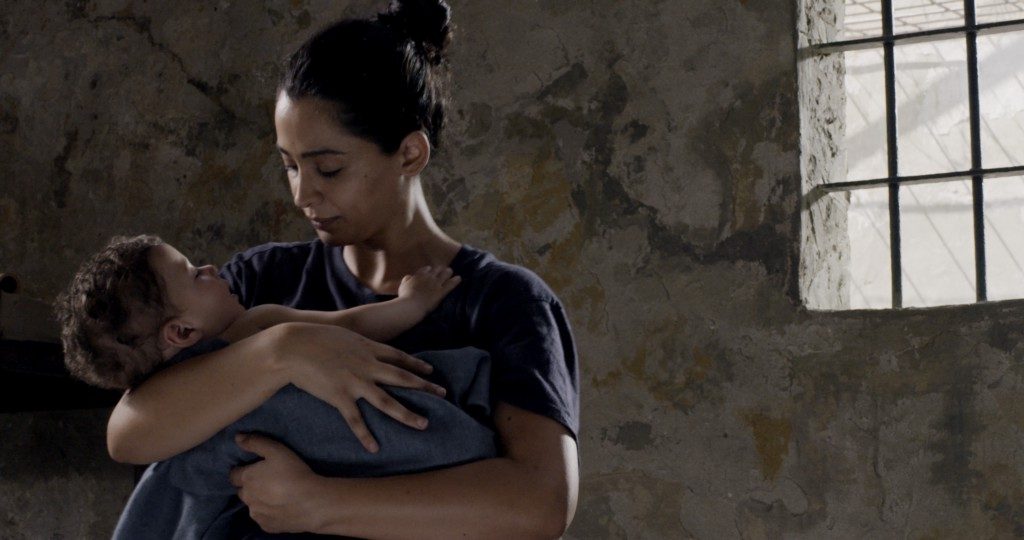Mai Masri is a Palestinian director who studied film at University of California, Berkeley and San Francisco State University. Her features include “Under the Rubble” and “Wild Flowers: Women of South Lebanon,” both co-directed with Jean Khalil Chamoun, “Children of Fire,” “Suspended Dreams,” “Children of Shatila” and “33 Days.” (Press materials)
“3000 Nights” will premiere at the 2015 Toronto International Film Festival on September 12.
W&H: Please give us your description of the film
MM: “3000 Nights” is the story of Layal, a young Palestinian schoolteacher who is arrested on false allegations and incarcerated in a high-security Israeli women’s prison where she encounters a terrifying world. When she finds out that she is pregnant, the prison director pressures her to abort the child and spy on her fellow inmates. Resilient and still in chains, she gives birth to a baby boy.
Through her struggle to raise her son behind bars and her relationship with the other prisoners, she manages to find a sense of hope and meaning to her life. Prison conditions deteriorate and the prisoners go on strike. The prison director warns Layal against joining the rebellion and threatens to take her son away. In a moment of truth, Layal is forced to make a choice that will forever change her life.
W&H: What drew you to this story?
MM: I met a woman who had given birth to a baby boy in an Israeli prison in the ’80s. Her story touched me deeply and made me curious to know more. Having just become a mother myself, I wanted to understand what it meant to give birth in chains and to raise a child behind bars.
I started researching and interviewing women who had given birth in detention. I was fascinated by their stories and the choices they made. I also found out a lot of things I didn’t know about the relationship between Israeli and Palestinian inmates.
I was mostly drawn to the human stories, the anecdotes, the imagination and humor. What struck me was not only the conflict, but the alliances that were forged by these women and how they developed and matured in prison.
Prisons and detention are themes that have figured strongly in my documentaries. I feel that prison is a metaphor for the condition of the Palestinian people and for Palestinian women in particular. As a Palestinian and a mother, I can relate to this feeling. For me, it’s not just about making a movie — it’s about telling a story that needs to be told.
W&H: What was the biggest challenge in making the film?
MM: My biggest challenge was how to make a film that was true to the spirit and reality of women prisoners, and at the same time poetic and aesthetic: a film that would bring out the inner world of these women and their creativity, imagination and humanity, and a film that would work for a local audience as well as an international audience.
I was lucky to have been able to shoot “3000 Nights” in an abandoned old military prison in Jordan. The oppressive atmosphere of the prison, with its thick, dilapidated walls and rusty bars, gave a huge authenticity to the set and provided an important psychological framework for the actors. The actors I cast were mostly women who had a strong connection with prison either directly through their own experiences or through their parents, siblings or relatives.
Working for long hours in desert heat was exhausting. It was also a big challenge to work with a two-year-old toddler. It was not an easy film to fund or shoot, especially since it was my first feature, but the commitment and enthusiasm of the cast and crew helped give me the strength to overcome the difficulties and rise up to the challenge.
W&H: What do you want people to think about when they are leaving the theater?
MM: I want them to be touched and inspired by the story and to feel the humanity and resilience of these women. I want “3000 Nights” to have a universal appeal that will resonate with themes of motherhood, freedom and justice anywhere in the world.
W&H: What advice do you have for other female directors?
MM: Be true to yourselves and what you believe in. Make films with passion, creativity, sweat and tears. Take risks and never give up!
W&H: What’s the biggest misconception about you and your work?
MM: Some people consider my films too strong or too political. They say that viewers prefer to watch light films that will relax and entertain them. I think it is possible to entertain people while also touching their hearts and challenging them to reflect and react. When people say I’m a committed filmmaker, I say I am a filmmaker that has something to say with passion and love!
W&H: How did you get your film funded? Share some insights into how you got the film made.
MM: I raised funds from a variety of public and private institutions, including French state funds (CNC, Foreign Ministry, Francophone funds), as well as co-production funds from Jordan (Royal Film Commission), Dubai Film Festival (Enjaaz), Doha Film Institute, Arab Cultural Fund (AFAC) and the Royal Film Commission — Jordan. The remaining funding came from personal and private loans.
W&H: Name your favorite woman-directed film and why.
MM: Jane Campion’s “The Piano” is my favorite film of all time. I love the story and setting, as well as the passion and creativity of the heroine. I like the mix of vulnerability and strength in her character and the way she is able to rebuild her life after hitting rock bottom and reaching the brink of despair. The film gave me a lot of insight into the condition of women in New Zealand in the nineteenth century and also today. This resonates strongly with my own work.







